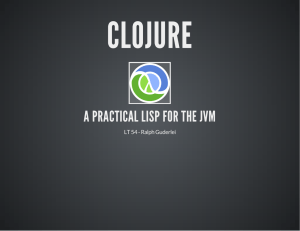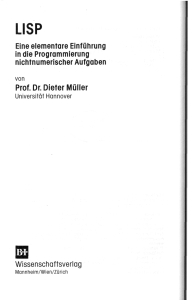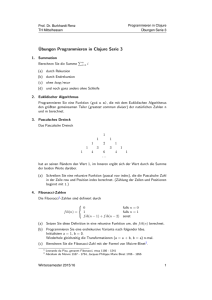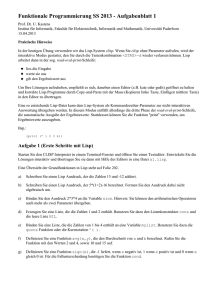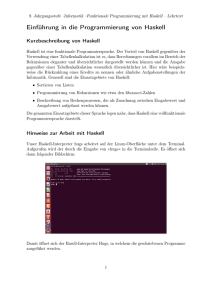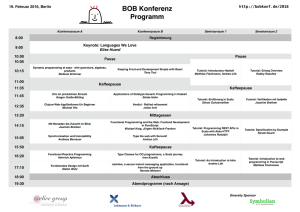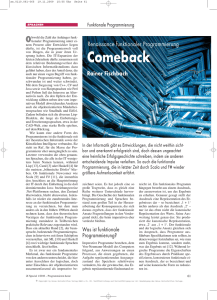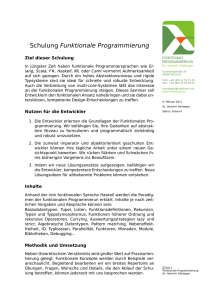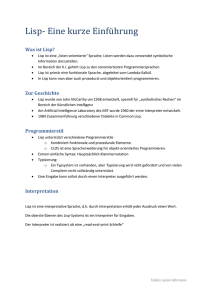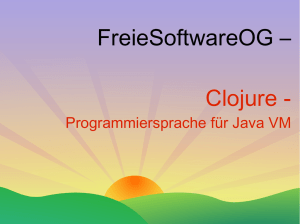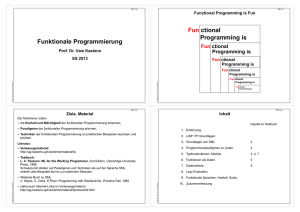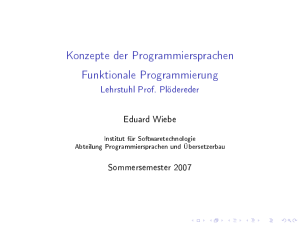Folien
Werbung
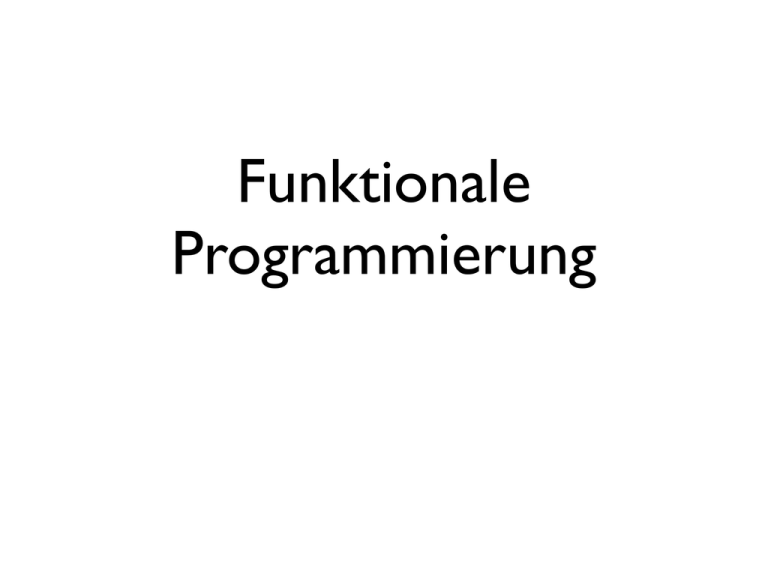
Funktionale
Programmierung
Organisatorisches
• Halbmodul im Masterstudiengang
• Termin: Donnerstags, 12:30 Uhr, HS 5G
• Ab etwa Mitte November zusätzlich •
•
•
Donnerstags, 8:30 Uhr, HS 5G
Es gibt keine Teilnahmepflicht und keine Abgabe
der Übungsaufgaben
Nächste Woche (23.10): VL um 8:30
Ich werde Sie per Mail (via LSF) informieren, wenn
sich etwas ändert
Projekt
• Falls es gewünscht wird, kann ich eine
Projektaufgabe stellen
• Das Projekt-Ergebnis hätte einen Anteil an
der Note
Sprache
• Clojure
• Ein auf funktionale
Programmierung
ausgerichtetes Lisp,
das auf der JVM
läuft
• Evtl. einen kleinen
Happen Haskell
oder Elixir
Prüfung
Klausur
Termin nach Vereinbarung + Raumverfügbarkeit
Evaluation 2013
Was ist funktionale
Programmierung?
Wikipedia
[...] functional programming is a programming paradigm [...]
that treats computation as the evaluation of mathematical
functions and avoids state and mutable data. Functional
programming emphasizes functions that produce results
that depend only on their inputs and not on the program
state - i.e. pure mathematical functions [...] Eliminating side
effects [...] can make it much easier to understand and
predict the behavior of a program, which is one of the key
motivations for the development of functional programming.
Kurzfassung
•
•
•
•
•
•
Programmierparadigma
mathematische Funktionen
vermeidet Zustand
vermeidet veränderbare "Objekte"
Keine Nebeneffekte / vermeidet Nebeneffekte
Einfacher zu verstehen und vorherzusagen
Erik Meijer
• Functional Programming is a style of
programming in which expressions are
more important than using statements
• Komplexe Ausdrücke werden durch
Komposition weniger komplexer Ausdrücke
erzeugt
Warum?
•
•
•
Welchen Wert hat x?
x = 1
x += ++x + ++x"
Perl? Groovy? JS? Php? Ruby? Python?
Welchen Wert hat x nach x = 1
x = x + (x+1)+(x+1)
Clojure?
• Clojure ist unsere Arbeitssprache
• Die Konzepte, die wir studieren sind aber
breiter gefasst
• Man kann in vielen Sprachen funktional
programmieren
• Sie sollen hier infiziert werden!
Funktionale Sprachen
im historischen
Überblick
Geschichte
• 1936 Turing
"On computational numbers
with an Application to the
Entscheidungsproblem"
• Einführung der Turing Maschine
um berechenbare Funktionen zu
formalisieren
!
1936 - Alan Turing invents every
programming language that will ever be but is
shanghaied by British Intelligence to be 007
before he can patent them.
A Brief, Incomplete, and Mostly Wrong History of Programming Languages
http://james-iry.blogspot.de/2009/05/brief-incomplete-and-mostly-wrong.html
Geschichte
• 1936 A. Church
"An unsolvable problem of
elementary number theory"
• In dem Paper wird der nicht
typisierte Lambda Kalkül
eingeführt als formaler Kalkül
für berechenbare Funktionen
Untypisierter 𝝺 Kalkül
• Grammatik: T ≔ V | T T | 𝝺V.T
• V:Variablen
• T: Term
• Erweiterungen
• Konstanten
• Zahlen
• mathematische Standardfunktionen
Der 𝝺 Kalkül
• 𝝺 V.T : Definiert eine Funktion, die den Parameter V
•
•
hat und als Ergebnis T liefert (üblicherweise
beinhaltet T die Variable V)
T1 T2 : Funktionsanwendung von T1 auf T2.
Beispiel (mit Erweiterung):
Definition der Quadratfunktion: 𝝺x.x*x
•
• Anwendung: 𝝺x.x*x 4 !
1936 - Alonzo Church also invents every
language that will ever be but does it better.
His lambda calculus is ignored because it is
insufficiently C-like. This criticism occurs in
spite of the fact that C has not yet been
invented.
A Brief, Incomplete, and Mostly Wrong History of Programming Languages
http://james-iry.blogspot.de/2009/05/brief-incomplete-and-mostly-wrong.html
Geschichte
• Satz: Turing Maschinen und untypisierter 𝝺
Kalkül sind gleich mächtig
• Beweisidee:
Implementiere
eine
TM
im
𝝺
Kalkül
•
• Implementiere einen Auswerter für den 𝝺
Kalkül auf einer TM
Geschichte
•
1958: McCarthy "Recursive Functions of Symbolic
Expressions and their Computation by
Machine, Part 1"
•
Das Paper beschreibt ein ProgrammierSystem (List Processing) um den
untypisierten 𝝺 Kalkül leichter benutzbar
zu machen
!
1958 - John McCarthy and Paul Graham
invent LISP. Due to high costs caused by a
post-war depletion of the strategic
parentheses reserve LISP never becomes
popular. In spite of its lack of popularity, LISP
remains an influential language in "key
algorithmic techniques such as recursion and
condescension"
A Brief, Incomplete, and Mostly Wrong History of Programming Languages
http://james-iry.blogspot.de/2009/05/brief-incomplete-and-mostly-wrong.html
Geschichte
•
1964: Kenneth Iverson: APL
•
Grosser Einfluss auf Matlab und
Mathematica
•
•
Hat ein eigenes Keyboard
'if you need more than one line of APL
you do not fully understand your
problem'
Geschichte
•
1972/74: Girard und Reynolds
entdecken unabhängig voneinander
System F
•
System F ist ein parametrischer
polymorpher 𝝺 Kalkül. •
Es gibt nicht nur Variablen für
Funktionen sondern auch für Typen
•
Eine Erweiterung von System F wird
seit 2008 für Haskell benutzt
Geschichte
•
Satz: Typinferenz ohne explizite Typannotationen für
System F ist unentscheidbar
•
Beweis: siehe J.B. Wells, 1998
"Typability and Type Checking in System F are
equivalent and undecidable"
Geschichte
•
•
1972: A. Colmerauer - Prolog
•
Man kann in Prolog funktional
programmieren
Einordnung als funktionale Sprache
wird Prolog nicht gerecht
!
1972 - Alain Colmerauer designs the logic
language Prolog. His goal is to create a
language with the intelligence of a two year
old. He proves he has reached his goal by
showing a Prolog session that says "No." to
every query.
A Brief, Incomplete, and Mostly Wrong History of Programming Languages
http://james-iry.blogspot.de/2009/05/brief-incomplete-and-mostly-wrong.html
Geschichte
• 1973: Charles 'Chuck' Moore Forth
• Imperative, stack basierte
Sprache
• Postfix Notation: 10 2 + dup * • Forth ist nicht funktional, hatte
aber Einfluss auf spätere
funktionale (konkatenative)
Sprachen
Stack basierte Sprachen
• Stack basierter Ansatz ist in VMs verbreitet
• JVM
• CPython VM, PyPy
• Warum sind VMs stack basiert?
!
Geschichte
•
•
1974: Sussman/Steele - Scheme
•
Scheme ist minimalistisch und
"funktionaler" als Lisp
Scheme wird als Lisp Dialekt für die
Lehre entwickelt
Geschichte
•
•
•
•
•
•
•
•
Zwischen 1975 und 1980 publizieren Steele und Sussman eine
Reihe von Artikeln, die oft als λ Papers bezeichnet werden !
Scheme: An Interpreter for Extended Lambda Calculus 1975
Lambda: The Ultimate Imperative 1976
Lambda: The Ultimate Declarative 1976 Lambda: The Ultimate GOTO 1977 The Art of the Interpreter 1978 Rabbit: A Compiler for Scheme 1978 Lambda: The Ultimate Opcode 1979
http://lambda-the-ultimate.org/
!
1970 - Guy Steele and Gerald Sussman
create Scheme. Their work leads to a series
of "Lambda the Ultimate" papers culminating
in "Lambda the Ultimate Kitchen Utensil."
This paper becomes the basis for a long
running, but ultimately unsuccessful run of
late night infomercials. Lambdas are relegated
to relative obscurity until Java makes them
popular by not having them.
A Brief, Incomplete, and Mostly Wrong History of Programming Languages
http://james-iry.blogspot.de/2009/05/brief-incomplete-and-mostly-wrong.html
Geschichte
•
1976: R. Millner "A theory of type polymorphism in
programming"
•
Neuartiger Inferenzalgorithmus
(Hindley-Millner Type Inference)
•
ML markiert den Anfang der statisch
typisierten funktionalen Sprachen
!
1973 - Robin Milner creates ML, a language
based on the M&M type theory. ML begets
SML which has a formally specified semantics.
When asked for a formal semantics of the
formal semantics Milner's head explodes.
Other well known languages in the ML family
include OCaml, F#, and Visual Basic.
A Brief, Incomplete, and Mostly Wrong History of Programming Languages
http://james-iry.blogspot.de/2009/05/brief-incomplete-and-mostly-wrong.html
Geschichte
•
•
•
1984: Lisp und ML werden standardisiert
Common Lisp
Standard ML
Geschichte
•
•
1984: Beginn der Arbeit an Coq
•
Implementierung einer funktionalen
Programmiersprache mit Dependent Typsystem •
Als "Nebeneffekt" generiert Coq Programme
Coq ist ein mathematisches Beweissystem /
Theorembeweiser
Geschichte
•
•
1986: J. Armstrong entwickelt Erlang
•
Erlang ist gedacht für hochgradig
nebenläufige Systeme •
Der zweite Fokus ist Fehlertoleranz
Der erste Erlang Prototyp wurde in
Prolog implementiert (das merkt
man)
Joe Armstrong über OO
“The problem with object-oriented languages is they’ve
got all this implicit environment that they carry around
with them.You wanted a banana but what you got was a
gorilla holding the banana and the entire jungle.” (Joe Armstrong)
Geschichte
•
•
1994: Apple - Dylan
•
•
Eine Mischung aus Lisp und Smalltalk
Hybrid aus funktionaler und objektorientierter
Sprache
Dylan ist praktisch tot, hatte aber starken Einfluss
auf Ruby
Geschichte
•
•
1995: Z. Somogyi - Mercury
•
•
Statisch typisiert
Mercury mischt logische und
funktionale Programmierung
Rein logisch (im Gegensatz zu Prolog)
Geschichte
•
•
1995: M. Hanus - Curry •
Curry ist ein Hybrid aus funktionaler
und logischer Sprache
Die zweite nach Haskell Curry
benannte Sprache
Geschichte
•
•
•
1995: OCaml
Sprache aus der ML Familie
OO Features
Geschichte
•
•
•
1995: Gosling - Java Keine funktionale Sprache
JVM
Geschichte
•
•
•
•
•
•
1998: Haskell 98 Standard
Haskell ist die wichtigste funktionale Sprache in der
Forschung
Statisch typisiert
Lazy Evaluation Pure! "Learning Haskell to improve one's Java skills is like
working on sushi knife technique to better amputate
one's way out of a beartrap." (@bos31337)
!
1990 - A committee formed by Simon
Peyton-Jones, Paul Hudak, Philip Wadler,
Ashton Kutcher, and People for the Ethical
Treatment of Animals creates Haskell, a pure,
non-strict, functional language. Haskell gets
some resistance due to the complexity of
using monads to control side effects. Wadler
tries to appease critics by explaining that "a
monad is a monoid in the category of
endofunctors, what's the problem?"
A Brief, Incomplete, and Mostly Wrong History of Programming Languages
http://james-iry.blogspot.de/2009/05/brief-incomplete-and-mostly-wrong.html
Geschichte
•
•
Ebenfalls 1998: Scheme R5RS
Standard für Scheme
Geschichte
•
•
1999: T. Coquand - Agda
•
•
Dependent Typsystem
Agda ist ein Beweisassistent und eine
funktionale Programmiersprache I'm going to write a long rant on how
the Agda and Coq communities thinks
the Haskell community is a bunch of
anything-goes hippies. (@jamesiry)
Geschichte
•
•
•
2001: M. von Thun - Joy
•
Konkatenative Sprache: Joy ist eine funktionale Sprache Idee: Jede Berechnung ist eine
Funktion von Stack nach Stack Programm Konkatenation == Funktionale Komposition
Geschichte
•
•
•
2003: Slava Pestov - Factor
Erste Implementierung: JFactor (JVM)
Es gibt eine Clojure DSL - Factjor (2013, Bloom)
Geschichte
•
•
2003: M. Odersky - Scala
•
•
Scala ist im Moment sehr populär
Scala ist ein funktionaleobjektorientierte Hybridsprache
Interessant für Java Programmierer ist
der Umgang mit Generics
Geschichte
Liskov'sches Substitutionsprinzip:
Sei P eine beweisbare Eigenschaft von Objekten des
Typs S. Dann soll P auch für Objekte des Typs T wahr
sein, wobei T ein Untertyp von S ist.
•
•
•
•
Immer wenn irgendwo S steht, kann man gedanklich T
dafür einsetzen
Bsp. S = Obst, T = Apfel
public void essen(Obst x) { ... }"
Apfel a = new Apfel();
essen(a);"
Geschichte
Frage: Wenn T ein Subtyp von S ist, was gilt für List<T>
und List<S> ?
A. List<T> ist Subtyp von List<S> ?
B. List<S> ist Subtyp von List<T> ?
C. Es gibt keine Vererbungsbeziehung zwischen List<S>
und List<T>?
D. Kann ich jemanden anrufen?
!
2003 - A drunken Martin Odersky sees a
Reese's Peanut Butter Cup ad featuring
somebody's peanut butter getting on
somebody else's chocolate and has an idea.
He creates Scala, a language that unifies
constructs from both object oriented and
functional languages. This pisses off both
groups and each promptly declares jihad.
!
A Brief, Incomplete, and Mostly Wrong History of Programming Languages
http://james-iry.blogspot.de/2009/05/brief-incomplete-and-mostly-wrong.html
Geschichte
•
•
•
2005: Microsoft - F#
•
Ursprünglich ein Forschungsprojekt, aber seit 2010
offiziell in Visual Studio unterstützt
•
Das F# Typsystem unterstützt Einheiten, der Typchecker
kann Fehler in physikalischen Einheiten finden
F# ist ein Abkömmling der ML Familie
Sehr nahe an OCaml (viele OCaml Programme können
direkt mit F# kompiliert werden)
Geschichte
•
•
3<m> + 3<s> gibt einen Typfehler
3<m> + 1 <cm> ergibt 301 <cm>
Geschichte
•
•
•
•
2005: M. Tarver - Qi
Ziel war ein modernes Lisp für die Lehre zu entwickeln
um zu verhindern, das Lisp stirbt
Qi basiert auf Common Lisp
Qi ist gescheitert, hat aber einige Eigenschaften, die es
bemerkenswert machen
Es verwendet den Sequenten Kalkül für das Typsystem Es hat Prolog und YACC als Subsprachen eingebettet
•
•
Geschichte
•
•
2009: R. Hickey - Clojure
•
•
Clojure ist ein Erfolg geworden
Ziel war ein modernes Lisp zu für die JVM
zu implementieren
Alles Weitere im Rest des Semesters!
Geschichte
•
•
•
2011: M. Tarver - Shen
•
Es ist für verschieden Lisps (u.a. Clojure) portiert
worden
Nachfolger / Fork von Qi Sehr ähnlich zu Qi, aber nicht mehr so stark an Common
Lisp gebunden
Geschichte
•
•
•
•
•
•
2011: Elixir
Läuft auf der Erlang BEAM-VM
modernisiertes Erlang
Syntax erinnert an Ruby
Meta-Programmierung
Polymorphismus wurde von Clojure adaptiert
Clojure: Getting started
Installation
• Bitte nicht per Paketmanager Clojure
installieren
• Stattdessen sollte man leiningen benutzen
Leinigen
Leiningen
•
•
Build System für Clojure
•
•
http://leiningen.org/
Maven kompatibel (benutzt Clojars Repository und
Maven Central)
Installation: https://raw.github.com/technomancy/
leiningen/stable/bin/lein runterladen, im Pfad
unterbringen und ausführbar machen
Leiningen Basics
• lein new <Projektname> • lein repl
• lein test • lein uberjar
Leiningen konfigurieren
• Leiningen legt im user home einen
Ordner .lein an
• In diesem Ordner kann man in einer Datei
profiles.clj zusätzliche leiningen Plugins
eintragen
{:user {:plugins [[lein-catnip "0.5.1"]]}}
IDE / Editor?
•
•
•
•
•
•
•
•
Emacs + Paredit
vim (Es gibt paredit, soll aber nicht so toll sein)
Counterclockwise (Eclipse)
Cursive (IntelliJ)
Lighttable
Nightcode Catnip
Notepad, Sublime Text, Textmate, ...
